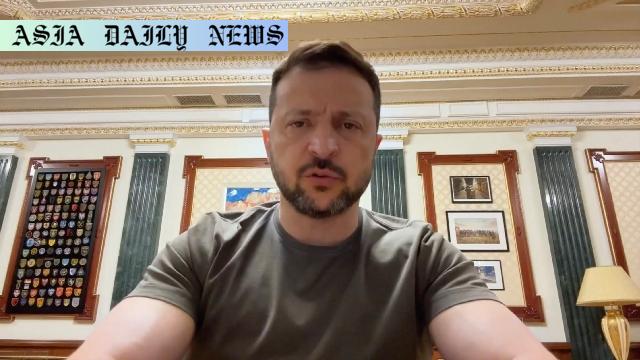Ceasefire: Zelenskyy criticizes Russia’s continued attacks despite declaring a truce to commemorate a historic event.
– Ukrainian President Zelenskyy criticizes Russia for violating ceasefire declarations.
– Russian drone and aerial attacks cause multiple civilian casualties in Kyiv, Kharkiv, and Donetsk.
– Zelenskyy demands an unconditional, immediate, and sustained ceasefire for peace.
– Russian truce linked to historic WWII commemoration faces global backlash.

Zelenskyy Condemns Continued Russian Aggression
Ukrainian President Volodymyr Zelenskyy has expressed strong disapproval of Russia’s actions, stating that the country has continued its offensive against Ukraine despite announcing a unilateral ceasefire. Reports indicate widespread destruction and casualties caused by Russian drone and aerial attacks over the weekend. Among the impacted areas were Kyiv, Kharkiv, and Donetsk, resulting in significant loss of life and civilian injuries. Fires broke out in the capital city due to attacks at a shopping mall and a high-rise building, further escalating fears among residents.
Zelenskyy summarized the violence in a social media post, revealing that over 1,180 drones and 1,360 guided aerial bombs have struck Ukraine over the week. This comes at a time when the Kremlin had called for a truce to mark 80 years since the Soviet Union’s victory in World War II. Zelenskyy criticized this announcement, stating it serves as little more than a pretense to normalize the continuous and aggressive military strikes happening on Ukrainian soil.
Call for a “Real Ceasefire”
The Ukrainian President has urged the global community to push for a genuine ceasefire. He emphasized that any declaration of peace should not be conditional upon symbolic occasions but should encompass daily practices of restraint and dialogue. He cited the need for an immediate, full, and unconditional cessation of hostilities that extends beyond Russia’s proposed three-day period to at least 30 days.
The Kremlin claims that the temporary truce is a goodwill gesture marking critical historical events. However, Zelenskyy asserts that true peace must be grounded in actions, not rhetoric. With daily assaults occurring, the timing of this ceasefire has only raised international skepticism about Russia’s intentions. Western nations, including the United States, insist that Russia take credible steps to de-escalate rather than exploit such announcements to gain tactical advantages.
International Reaction and Humanitarian Perspective
The international community has responded cautiously to Russia’s truce announcement. Observers point out that the so-called ceasefire provides no respite for citizens caught in the crossfire. Ukrainian and Western media outlets view such moves as political theatrics by the Kremlin, intended to divert attention from Russia’s prolonged aggression.
Humanitarian organizations have echoed Zelenskyy’s call for a lasting solution. They argue that the destruction of infrastructure, the displacement of families, and the loss of civilian lives necessitate actionable peace, not just symbolic demonstrations. Russia’s continued targeting of residential areas undercuts the trust needed for any meaningful negotiations. Without a concrete commitment to long-term peace, movements for truce feel hollow.
A Step Toward Lasting Peace
Zelenskyy’s emphasis on an extended, guaranteed ceasefire underscores the dire state of affairs on the ground. The leaders of NATO and the United Nations have backed Ukraine’s call, urging Russia to take accountability and engage in direct peace talks. As the crisis deepens, the prospect of sustained international mediation grows more urgent.
Ukraine continues to suffer under intensified Russian offensives, and diplomatic efforts seem far from resolution. A genuine ceasefire represents not only military restraint but also a gesture toward rebuilding trust and stability in the region. Zelenskyy’s appeals, grounded in the lived experiences of his citizens, resonate with a war-weary world yearning for peace.



Commentary
The Complex Realities of the Proposed Ceasefire
The announcement by Russia of a three-day ceasefire as a gesture tied to historical commemoration feels, at best, symbolic and, at worst, deeply cynical. President Zelenskyy’s frustration with this seemingly hollow gesture is justified. The reported continued attacks on Ukraine highlight the chasm between the words spoken by Russia’s leadership and their actions on the ground. The humanitarian toll of such aggression contradicts the message of goodwill that a ceasefire purports to represent.
Russia’s Motivations Under Scrutiny
It is essential to examine Russia’s intentions behind proposing a truce against the backdrop of ongoing violence. The timing, coinciding with celebrations of historical significance, seems to focus more on internal propaganda than on a genuine effort toward achieving peace. Such moves, while strategically convenient, risk alienating the international community and further undermining trust in diplomatic negotiations.
The Need for Global Action
The current situation underscores how crucial international pressure and involvement have become. Zelenskyy’s call for a 30-day ceasefire is not only more reasonable but also an indication of his commitment to seeking long-term solutions over mere symbolic actions. While Western nations have provided strong rhetoric and sanctions, tangible, united actions are paramount. Efforts must focus on ensuring an enforceable and monitored truce that prioritizes the well-being of civilians.
A Turning Point for Ukraine
The resilience shown by Ukraine in the face of continued aggression is commendable. Zelenskyy’s leadership has effectively rallied his citizens and drawn global attention to his nation’s plight. His insistence on a comprehensive ceasefire represents a stark contrast to the mixed signals issued by the Kremlin. This moment serves as a reminder to the global community that enduring peace requires genuine engagement, not temporary agreements of expediency.